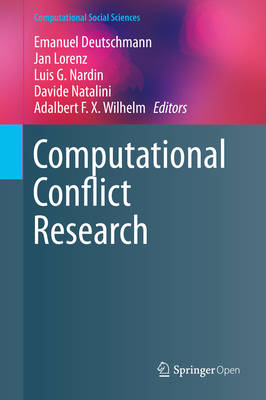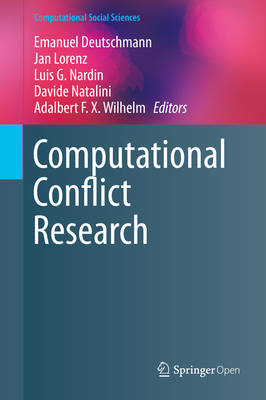
- Afhalen na 1 uur in een winkel met voorraad
- Gratis thuislevering in België vanaf € 30
- Ruim aanbod met 7 miljoen producten
- Afhalen na 1 uur in een winkel met voorraad
- Gratis thuislevering in België vanaf € 30
- Ruim aanbod met 7 miljoen producten
Zoeken
Computational Conflict Research
€ 52,95
+ 105 punten
Omschrijving
This open access book brings together a set of original studies that use cutting-edge computational methods to investigate conflict at various geographic scales and degrees of intensity and violence. Methodologically, this book covers a variety of computational approaches from text mining and machine learning to agent-based modelling and social network analysis. Empirical cases range from migration policy framing in North America and street protests in Iran to violence against civilians in Congo and food riots world-wide.
Supplementary materials in the book include a comprehensive list of the datasets on conflict and dissent, as well as resources to online repositories where the annotated code and data of individual chapters can be found and where (agent-based) models can be re-produced and altered. These materials are a valuable resource for those wishing to retrace and learn from the analyses described in this volume and adapt and apply them to their own research interests.
By bringing together novel research through an international team of scholars from a range of disciplines, Computational Conflict Research pioneers and maps this emerging field. The book will appeal to students, scholars, and anyone interested in the prospects of using computational social sciences to advance our understanding of conflict dynamics.
Supplementary materials in the book include a comprehensive list of the datasets on conflict and dissent, as well as resources to online repositories where the annotated code and data of individual chapters can be found and where (agent-based) models can be re-produced and altered. These materials are a valuable resource for those wishing to retrace and learn from the analyses described in this volume and adapt and apply them to their own research interests.
By bringing together novel research through an international team of scholars from a range of disciplines, Computational Conflict Research pioneers and maps this emerging field. The book will appeal to students, scholars, and anyone interested in the prospects of using computational social sciences to advance our understanding of conflict dynamics.
Specificaties
Betrokkenen
- Uitgeverij:
Inhoud
- Aantal bladzijden:
- 264
- Taal:
- Engels
- Reeks:
Eigenschappen
- Productcode (EAN):
- 9783030293321
- Verschijningsdatum:
- 15/11/2019
- Uitvoering:
- Hardcover
- Formaat:
- Genaaid
- Afmetingen:
- 156 mm x 234 mm
- Gewicht:
- 576 g

Alleen bij Standaard Boekhandel
+ 105 punten op je klantenkaart van Standaard Boekhandel
Beoordelingen
We publiceren alleen reviews die voldoen aan de voorwaarden voor reviews. Bekijk onze voorwaarden voor reviews.










